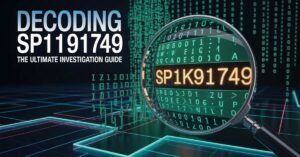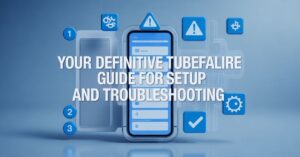Worried that checking loan options on Traceloans.com will hurt your credit score? This fear is common, but navigating the platform safely comes down to understanding one critical technical difference. By the end of this guide, you will know exactly how Traceloans uses your data, the precise step where your score is protected or at risk, and the actionable steps to get loan quotes with complete confidence.
How Traceloans.com Checks Your Credit Safely
At its core, Traceloans.com is a loan aggregation platform, not a direct lender. Its primary function is to connect borrowers with potential lenders from its network. To do this efficiently without harming your financial standing, it relies on a specific type of credit check.
What Is a Soft Credit Pull?
A soft inquiry (or soft pull) is a high-level check of your credit report. It’s used to pre-qualify you and give a snapshot of your creditworthiness. Crucially, it is not associated with a formal application for new credit. Think of it as a lender viewing your public profile; it’s visible to you but doesn’t affect your score for other lenders.
Why This Initial Check Doesn’t Lower Your Score?
Soft pulls are not factored into your FICO® Score or VantageScore® calculations. When you submit your initial information on Traceloans.com, the platform uses a soft pull to match you with lenders. This process allows you to see what loan offers you might qualify for without any negative impact on your credit health, which is the central benefit of using such a platform.
Understand Soft vs Hard Inquiries First
To truly master your credit score management, you must understand the critical difference between the two types of credit checks.
Seeing Soft Inquiries on Your Credit Report
You can see a record of soft inquiries on the personal copy of your credit report from AnnualCreditReport.com. They are often listed under a section like “Requests viewed only by you” and include activities like pre-approved offers and account reviews by your existing creditors.
How a Hard Inquiry Actually Affects You
A hard inquiry (or hard pull) occurs when you formally apply for credit, such as a mortgage, auto loan, or credit card. This is a full review of your credit history initiated by your explicit consent. Each hard pull can typically lower your FICO Score by a few points and will remain on your report for two years. This is the action you need to be aware of when proceeding with a specific lender.
The Step-by-Step Traceloans.com Process
Understanding the data flow is key to feeling in control. Here’s what happens behind the scenes.
Step 1: Submitting Your Initial Information
You enter your personal, financial, and desired loan amount on Traceloans.com’s secure form.
Step 2: The Matching Algorithm and Lenders
Traceloans.com uses your data to perform a soft credit check with one or more major credit bureaus (Experian, TransUnion, Equifax). Its algorithm then instantly matches your profile against the criteria of its partnered lending network.
Step 3: Reviewing Your Personalized Offers
You are presented with a list of potential loan offers, including amounts, terms, and estimated APR ranges. At this stage, you have only undergone a soft pull.
Protect Your Score When You Apply
This is the most critical section. Your credit score remains safe until you take this final step.
The Critical Moment Your Score Is At Risk
Your score is only at risk when you decide to move forward with a specific lender’s offer. Clicking on an offer will redirect you from Traceloans.com to the lender’s own website.
How to Verify Lender Terms Before Proceeding
On the lender’s site, before you submit a formal application, read the terms and conditions meticulously. Look for language that explicitly asks for your permission to perform a “hard credit inquiry” or to pull your “full credit report.” This is your point of consent.
Monitoring Your Credit Report Afterward
Always monitor your financial health. Use free services like AnnualCreditReport.com to regularly check your report. This allows you to verify that all hard inquiries were authorized and to spot any errors or fraudulent activity quickly.
Conclusion: Navigating with Confidence
Using Traceloans.com for a credit score check can be a safe and efficient way to shop for loan offers—if you understand the mechanics. The platform itself uses a harmless soft pull to generate your options. The responsibility for protecting your score shifts to you during the final application step with a chosen lender. By knowing the difference between a soft and hard inquiry and giving your consent knowingly, you can leverage these fintech tools to your advantage without fear.
FAQ’s
Is Traceloans.com a legitimate company?
Yes, Traceloans.com is a legitimate loan aggregation service. However, as a connector, it’s crucial to research the individual lender you are matched with before proceeding with a formal application.
Can I get a loan through Traceloans.com with bad credit?
Yes, it’s possible. The platform works with lenders that cater to a range of credit profiles, including subprime lenders. Be aware that if you have a lower credit score, the loan offers you receive will likely have higher interest rates.
What should I do if I see a hard inquiry I didn’t authorize?
If you find a hard pull from a lender you don’t recognize, your first step should be to contact that lender directly to inquire. If you believe it is an error or a sign of identity theft, you can dispute the inquiry directly with the credit bureau (Experian, TransUnion, or Equifax) where it appears.
Continue your learning journey. Explore more helpful tech guides and productivity tips on my site Techynators.com.

Hi, I’m James Anderson, a tech writer with 5 years of experience in technology content. I’m passionate about sharing insightful stories about groundbreaking innovations, tech trends, and remarkable advancements. Through Techynators.com, I bring you in-depth, well-researched, and engaging articles that keep you both informed and excited about the evolving world of technology. Let’s explore the future of tech together!








